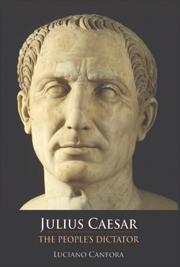Book contents
- Frontmatter
- Contents
- Translators' Note
- Acknowledgements
- Foreword
- PART I FROM SULLA TO CATILINE
- PART II FROM THE TRIUMVIRATE TO THE CONQUEST OF GAUL
- PART III THE LONG CIVIL WAR
- PART IV FROM THE CONSPIRACY TO THE TRIUMPH OF CAESARISM
- 29 Inklings of Conspiracy
- 30 ‘Iure caesus’
- 31 The Lupercalia Drama
- 32 The Dictatorship
- 33 Epicureans in Revolt?
- 34 The Hetairia of Cassius and the Recruitment of Brutus
- 35 A Conspirator's Realism: Cassius Settles for the Second Rank
- 36 Some Unexpected Refusals
- 37 Cicero – an Organiser of the Conspiracy?
- 38 The Serious Mistake of Dismissing the Escort
- 39 The Dynamics of the ‘Tyrannicide’
- 40 ‘Where's Antony?’
- 41 Caesar's Body: How to Turn Victory into Defeat
- 42 The Wind
- Chronology
- Bibliography
- Index
37 - Cicero – an Organiser of the Conspiracy?
from PART IV - FROM THE CONSPIRACY TO THE TRIUMPH OF CAESARISM
Published online by Cambridge University Press: 05 August 2013
- Frontmatter
- Contents
- Translators' Note
- Acknowledgements
- Foreword
- PART I FROM SULLA TO CATILINE
- PART II FROM THE TRIUMVIRATE TO THE CONQUEST OF GAUL
- PART III THE LONG CIVIL WAR
- PART IV FROM THE CONSPIRACY TO THE TRIUMPH OF CAESARISM
- 29 Inklings of Conspiracy
- 30 ‘Iure caesus’
- 31 The Lupercalia Drama
- 32 The Dictatorship
- 33 Epicureans in Revolt?
- 34 The Hetairia of Cassius and the Recruitment of Brutus
- 35 A Conspirator's Realism: Cassius Settles for the Second Rank
- 36 Some Unexpected Refusals
- 37 Cicero – an Organiser of the Conspiracy?
- 38 The Serious Mistake of Dismissing the Escort
- 39 The Dynamics of the ‘Tyrannicide’
- 40 ‘Where's Antony?’
- 41 Caesar's Body: How to Turn Victory into Defeat
- 42 The Wind
- Chronology
- Bibliography
- Index
Summary
Speaking in the Senate on 19 September 44 bc, in the absence of Cicero, Antony made a serious accusation: ‘When Caesar had been slain, Brutus, whom I name with respect, at once lifting high his bloody dagger, shouted for Cicero by name, and congratulated him on the recovery of freedom’. From Brutus' remark (which Cicero does not deny) Antony concluded, perhaps rightly, that Cicero was not unaware of the conspiracy. In the Second Philippic, a savagely Demosthenian reply that was never delivered, Cicero accurately quotes Antony's words and hits back with a detailed and deadly polemical retaliation: he recalls the blackest stain on Antony's ‘Caesarian’ career – his complicity in the plan to assassinate Caesar the previous year, shortly after Munda. Cicero's reminder was also a gift to Octavian, since at the time he actually published this damaging pamphlet he was already in touch with Octavian.
In his answer Cicero establishes, rightly, a connection between Antony's compromise the previous summer and the strange moment during the assassination when Trebonius, who had informed Antony about the conspiracy a year earlier, kept him out of Pompey's Curia while the others carried out the stabbing. Here Cicero expresses himself in a way that at first sight might lead one to think that Cicero himself was a witness: ‘[you] who were, we have seen [vidimus], drawn aside by Trebonius at the time when Caesar was being slain’ (Philippics 2.34).
- Type
- Chapter
- Information
- Julius CaesarThe People's Dictator, pp. 317 - 321Publisher: Edinburgh University PressPrint publication year: 2007



